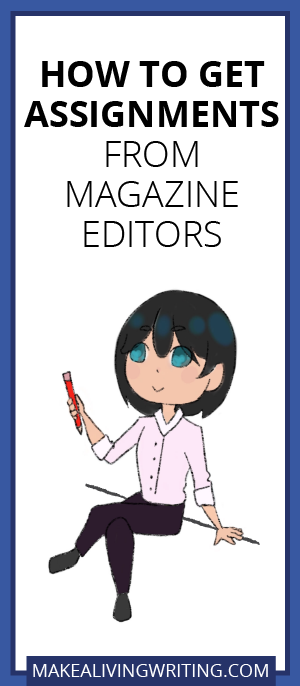
You know they sift through a ton of query letters and pitches. And many of those end up in the slush pile.
They’re always on a deadline. Probably a little stressed. And they count on freelance writers to help produce great content for their publication and readers.
But what is it that magazine editors look for in a pitch or query letter? And how do you get past the delete button when an editor sees your email?
If you want to write for magazines, even pro freelancers will tell you rejection is part of the gig.
But if you can learn to think the way magazine editors do, you’ll significantly increase your chances of making a connection and landing assignments to make a living writing.
We recently caught up with two smart freelancers to learn more about what it’s like for magazine editors, what they’re looking for, and how to stand out when you pitch a story idea. Here’s what you need to know:
Meet two freelancers who know what magazine editors want
Want to know what magazine editors want? We recently caught up with two freelancers on a Freelance Writers Den podcast to learn more about what editors want. Meet Zachary Petit and Elizabeth Pagel-Hogan.

Zachary Petit
Zachary Petit is a long-time freelance writer and author of the book, The Essential Guide to Freelance Writing: How to Write, Work and Thrive On Your Own Terms.
He’s the former magazine editor for publications like PRINT and Writer’s Digest magazine.
He’s also written thousands of stories for newspapers and magazines, including National Geographic, and Mental Floss, and co-wrote several books.
Elizabeth Pagel-Hogan
Elizabeth Pagel-Hogan is a freelance writer for children’s magazines like Highlights for Children, Muse, and Cricket.
When she decided to step away from teaching at Carnegie Science Center, Pagel-Hogan carved out a successful freelance career writing for children’s magazines.
1. How do you come up with story ideas and find magazines to pitch?
Elizabeth: Be curious. Be nosy. Look at every magazine in doctor’s offices, restaurants, the local bakery, kids daycare, or standing in line at the grocery store. You never know what you’re going to happen upon. It’s a great way to develop story ideas and learn about new magazines you could write for.
2. How do you figure out which editor you should pitch your story idea to?
Zachary: The easiest way. Hop on the website and look for contact information or check the masthead for staff names and titles. If you don’t know which of the magazine editors to pitch, my strategy is to always go with the managing editor. The managing editor serves as kind of the cog in the wheel of the publication who can send your pitch to the right person.
3. Should you pitch magazine editors at smaller publications before you pitch your dream markets?
Elizabeth: I dive right in. I see no reason to hold back. I have an optimistic viewpoint. I believe that if you have written something perfect for the publication, the magazine editor doesn’t care what your credentials are. If your piece is perfect for their magazine and readers, they’re going to take it.
Here’s an example. My first big glossy assignment that paid really well was for Family Fun magazine. I had very little writing experience. I didn’t even have any clips I could send. But I had an idea that matched exactly what the editor was looking for. I spent a lot of time developing a well-written pitch with interesting anecdotes. And they bought it. It really showed me I could do this if I worked hard on what the editor wanted and what their style was.
4. Is it OK to pitch magazine editors on social media?
Zachary: That’s an interesting question. In the magazine world, it’s kind of funny how editors feel about this. Some editors kind of feel like it’s an invasion of privacy to hit them up on social media. I’m not that way as an editor.
If someone hits me up on social, “Can I query you?” I’m actually kind of flattered. But it really depends on how the editor you’re reaching out to feels about social media. If you don’t know, which you probably won’t, just go with the traditional route for sending a pitch via email to avoid offending an editor’s particular senses.
5. Should you pitch small front-of-book assignments or full-on features first?
Elizabeth: I’m an optimist. Go big and just hit send. If you’re pitching an article idea that’s exactly what the magazine editor wants, there’s no reason to limit yourself to some little piece first. Study the magazine. Get to kow what readers like. Develop your story idea. Then write a query that lists your sources, outlines your article, how it’s going to flow, and suggest sidebars. Then hit send.
Don’t hesitate. Move on to the next pitch. You cant do one thing and wait for it to pan out before you try the next thing, if you really want this to be your functional source of income.
6. How can you make your email subject line stand out to magazine editors?
Zachary: I recently started teaching magazine writing at the University of Cincinnati. I’ve been hammering this point because it’s essential for querying editors. The easiest way to get your query overlooked or deleted by an editor is a bad subject line. You clearly want to avoid anything that might remotely look like a pitch from a PR person.
Here’s a format I use when I pitch magazine editors:
- First/Last Name of the editor
- Story Idea: or Query Letter. Something that signals the editor this is a pitch
- Slug idea: A working headline or title to entice the editor and give them some idea of what your story is going to be about. Here’s an example:
- Zachary Petit: Story Idea: More Bubbles and Cash Flow for Founders of Dog Shampoo Business
When you query an editor with their name in the subject line it does a few things.
- It shows that you’ve done some research to find the right person to pitch.
- It stands out from all the bad stuff that end up in the slush pile. A
- It lets the editor know you’re a contender for getting an assignment.
- And just on a psychological level, when an editor sees their name in the subject line of an email is hard to ignore.
One more thing: Never begin your query letter with “Dear Editor,” “To whom it may concern,” or “Dear Sirs,” which amazingly people still use.
7. Do magazine editors want to see multi-pitch query letters?
Elizabeth: If you have a whole bunch of story ideas suitable for a publication why hold back and hoard them? It’s not going to make you any money just sitting on good story ideas. I mainly write for children’s magazines, and I’ve pitched four story ideas at once before with a bunch of different angles.
Sending in multiple ideas won’t always turn into a direct assignment. Even if an editor doesn’t pick any of your ideas, it does something important. It gives editors a sense that you’re a person who is productive, that you have a creative mindset, and that you are someone they can go to for material.
8. How should you pitch an editor you’ve worked with before?
Zachary: Let me say this. Relationships are at the heart of freelancing. If you’ve made a connection and worked with an editor before, go with a casual tone: How are you? You want to be the writer the editor is coming to with assignments.
The more you can appeal to editors on a personal level, the more likely that’s going to happen for you. The more you and an editor can work together as humans, without this clear delineation and sense of formality, the better. You’ll make their job a lot easier and enjoyable.
After you’ve got an assignment, communication is key. As an editor, I’d much rather have a writer come to me with a problem like not being able to reach a source, or the story structure we discussed isn’t working, than turn in a story at the very end with issues that could have been resolved with a quick email or phone call.
9. Should you pre-interview a source before you pitch a story idea?
Elizabeth: Getting an interview with a source or confirming a source will agree to be interviewed for your story really solidifies your query to an editor. It shows the editor you know what you’re doing.
Sometimes you have to explain the process to sources. You know, you’re pitching this story idea, doing a round of interviews, you’ll follow up if you get the assignment, or it may not lead to anything further.
I just did this for an article I pitched about a team of scientists teaching a computer how to play a specific kind of poker to compete in a tournament. I contacted their university PR person to set up interviews with the scientists if I got the assignment. He hooked me up, lined up interviews, sent free press photos, and the editor really liked my pitch.
10. How do you handle the waiting game of hearing back from magazine editors?
Elizabeth: Be yourself. Be hopeful. I remember the very first pitch I sent to PTO Today magazine, which is one of my regular clients now. I didn’t hear back from the editor for six months. All three of my pitches were rejected. But the editor told me something I’ll never forget:
I’m really sorry it’s taken so long to get back to you. We read your pitches. And even though they’re not what we want, we can see you’re a good enough writer to do these other assignments.
When you take this approach, put yourself out there, and keep going, good things are going to happen. Believe there’s an opportunity for you at any publication you want to pitch.
Pitch magazines editors to make a living writing
If you want to write for magazines, make it a habit to crank out good query letters or pitch letters. Set a daily, weekly, or monthly goal. Study the publication, back issues, and readership. Develop a solid story idea. Find out who the right editor to contact is, send your pitch, and keep going. You got this!
Need help pitching magazine editors? Leave a comment and let’s discuss.
Evan Jensen is the blog editor for Make a Living Writing. When he’s not on a writing deadline or catching up on emails, he’s training to run another 100-mile ultra-marathon.












